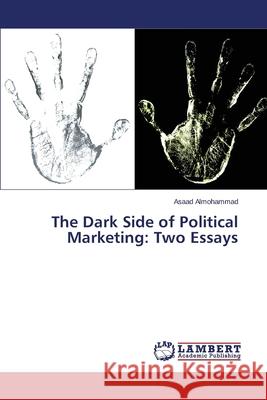The Dark Side of Political Marketing: Two Essays » książka
The Dark Side of Political Marketing: Two Essays
ISBN-13: 9783848434312 / Angielski / Miękka / 2013 / 148 str.
Marketing and politics theories have evolved in reciprocal response to all-out development in their sects and other disciplines. Through this book, I endeavour to shed some light on the utilisation of political and marketing concepts and applications, by terrorist and tyrannical regimes, for ill. The first objective is to conceptualise zealous Islamists' transformation to loyal jihadists through an intensive crossfertilisation of theories and application from the fields of politics, psychology, and marketing. I also present netizens' activism and challenges to two theories of shared thoughts and actions, demonstrate the story of social networking and the Arab Spring. In this study, I narrow the scope of this study to the protest phase of the conflict in Syria. To that end, the contents of a number of leaked emails are presented to uncover the utilisation of political branding by the Syrian's regime to achieve a set of political goals. Consequently, the impact of al-Assad brand image and his rhetoric brand equity on political cynicism of pro-democracy netizens were described conceptually and empirically. Finally, I conclude by discussing each essay findings.
Marketing and politics theories have evolved in reciprocal response to all-out development in their sects and other disciplines. Through this book, I endeavour to shed some light on the utilisation of political and marketing concepts and applications, by terrorist and tyrannical regimes, for ill. The first objective is to conceptualise zealous Islamists transformation to loyal jihadists through an intensive crossfertilisation of theories and application from the fields of politics, psychology, and marketing. I also present netizens activism and challenges to two theories of shared thoughts and actions, demonstrate the story of social networking and the Arab Spring. In this study, I narrow the scope of this study to the protest phase of the conflict in Syria. To that end, the contents of a number of leaked emails are presented to uncover the utilisation of political branding by the Syrians regime to achieve a set of political goals. Consequently, the impact of al-Assad brand image and his rhetoric brand equity on political cynicism of pro-democracy netizens were described conceptually and empirically. Finally, I conclude by discussing each essay findings.











